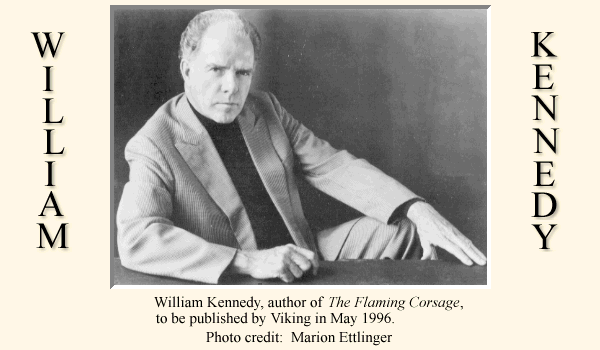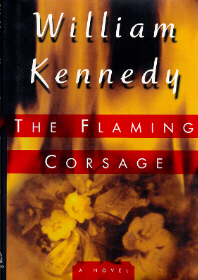

"WILLIAM KENNEDY'S Albany Cycle of novels has manifested authentic vitality from the start, and seemed to have reached an apotheosis with Ironweed, in particular. The Flaming Corsage transforms the cycle into what Ruskin praised as "Stage Fire" in Dickens. At once prose-poem, historical novel, and theatrical melodrama, Kennedy's new book demonstrates an aesthetic exuberance beyond his previous work. Katrina Taylor is Kennedy's most memorable character, nuanced and doom-eager, certain to haunt the sensitive reader." � Harold Bloom

The Flaming Corsage opens in a Manhattan hotel room, two women and a man present. Into the room bursts a second man, who transforms the scene into what the tabloids come to call "The Love Nest Killings of 1908." The mystery of that carnage will not come fully unraveled until destiny enwraps the novel's principal and most memorable characters, Katrina Taylor and Edward Daugherty.
He is a first-generation Irish American who will break out beyond Albany as a playwright. She is a high-born Protestant, a beautiful and seductive woman with complex attitudes towards life. Theirs is a passionate attachment from the first, simple and unrestrained on Edward's part, more indecisive for Katrina, who, remembering her poet Baudelaire, regards love as apposite to death, "the divine elixir that gives us the heart to follow the endless night." But when the great stalker strikes close to her family in the central event of the novel, a cataclysmic hotel fire, the marriage changes into something else altogether.
With virtuosic skill, Kennedy moves The Flaming Corsage back and forward in time from 1884 to 1912, following the fates of Katrina and Edward as other lives impact upon theirs. These others range from their socially opposed families to Katrina's lover, Francis Phelan; Edward's flirtatious actress paramour, Melissa Spencer; the rashly extroverted physician Giles Fitzroy and his wife, Felicity; and Edward's unnerving friend, the cynical journalist Thomas Maginn.
This sixth novel in William Kennedy's internationally acclaimed Albany Cycle, original and multidimensional in its reach, swings from joy to melancholy, from love to loss, from fellowship to violence, illuminating the seething contradictory impulses of our humanity.